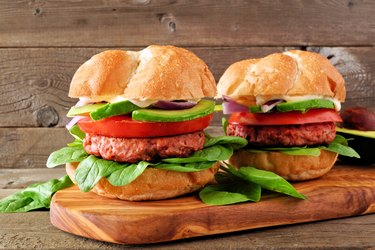
When it comes to dieting, we can't seem to keep things simple. Just as we've seen variations on the keto diet (think: lazy keto, targeted keto, dirty keto and so on), we're now seeing something similar with the vegan diet. There's the veggan diet — that is, a vegan diet that includes eggs — the pegan diet and now the dirty vegan diet.
We know a traditional vegan diet has health benefits, but what exactly is the dirty vegan diet, and is it healthy?
Video of the Day
Video of the Day
What Is the Dirty Vegan Diet?
While a vegan diet is easily defined — it's a plant-based diet void of all animal products — the dirty vegan diet is not so straightforward. There are two variations of the term "dirty vegan" that are centered on eating a plant-based diet.
The predominant usage of the term refers to an unhealthy version of a vegan diet. The diet includes no shortage of highly processed vegan adaptations of traditional animal-based products like ice cream, burgers, pizza, "chicken" nuggets and so on. This is quite different from a "clean" vegan diet, which is centered around whole, plant-based, minimally processed foods like beans, whole grains, fruits, vegetables and nuts.
Another variation of the term "dirty vegan" is used to describe a person, not a diet itself. It's another name for "chegan," aka, a vegan who strays or cheats on their plant-based diet from time to time. The "cheat" meal or food isn't necessarily unhealthy in nature, but it does contain animal products (think: a cheeseburger, steak, pizza, fish, etc.).
What Foods Can You Eat on the Dirty Vegan Diet and What Should You Avoid?
The dirty vegan diet is entirely plant-based but includes a good amount of highly processed vegan food products, too.
Foods to Eat
- Plant-based yogurt, cheese and milk
- Vegan meats (burgers, sausages, hot dogs, bacon, etc.)
- Plant-based junk food: pizzas, mac and cheese, chicken nuggets and wings
- Vegan desserts (ice cream, cookies, brownies and doughnuts)
- Fruits and veggies
- Whole and refined grains
- Pulses and legumes
- Nuts and seeds
Foods to Avoid
The only off-limit foods on the dirty vegan diet are animal-based products:
- Meats and poultry
- Fish and seafood
- Dairy
- Eggs
- Honey
Related Reading
Is It Healthy?
No. A balanced vegan diet rooted in a variety of whole minimally processed foods can be healthy. One that places an emphasis on plant-based processed meats and other foods? Not so much.
A vegan diet has many health benefits but it's not just avoiding animal products that make this diet a standout — the quality of the foods you're eating count too, according to a July 2017 study published in the Journal of the American College of Cardiology.
The study looked at the diets of more than 110,000 men and women and found that plant-based eaters who enjoyed a diet focused on whole grains, beans, nuts, fruits and vegetables had a significantly lower risk of heart disease. On the other hand, plant-based eaters who frequently indulged in sugary beverages, refined grains and other highly processed foods, aka the tenets of the dirty vegan diet, had a higher risk of heart disease.
Related Reading
Can the Dirty Vegan Diet Help You Lose Weight?
Not likely. This is basically a plant-based version of a highly processed junk food diet, void of any real substantial nutrition. Just because a diet is "vegan," it doesn't mean it's good for you. Highly processed foods tend to be higher in calories, saturated fat, sugar and sodium and low in crucial nutrients like fiber, vitamins and minerals.
Related Reading
The Pros and Cons
Following the dirty vegan diet provides you with more options at mealtime. Still, as you've seen, there are some serious drawbacks as well.
Pros
- Offers flexibility to a vegan diet: It's no secret that interest in plant-based diets has been on the rise but making the leap to a full-blown vegan diet can be a hard transition for some. If your sole intention is to eat plant-based, whether for the environment or animals, a dirty vegan diet may be an easier approach for some, depending on where they're starting. Better yet, if you used the dirty vegan diet as a transition to a vegan diet only, or, if you kept the "dirty" part of the vegan diet to a minimum, this wouldn't be an unhealthy diet.
- Better for animals and Mother Earth: Raising animals for consumption puts a serious strain on our natural resources and the planet. The amount of water it requires to sustain animal agriculture is astronomical. It also stresses our soil and air, too. This aside, eating a plant-based diet is a more ethical option for the treatment of animals.
Cons
- It's unhealthy: As we discussed, just because a diet is plant-based doesn't mean it's healthy. The quality of the food you eat plays a role in determining the quality of your health.
- It can be expensive: Most of these overly processed plant-based products are pricey. Example: a can of beans has 2 to 3 servings and costs less than $1. A package of two plant-based burger patties cost about $7.
Related Reading
Bottom Line
Any diet that emphasizes highly processed foods isn't going to be good for you. If you're on a vegan diet or interested in trying it, a healthier approach is focusing on whole foods. Whole grains, fruits, vegetables, nuts, beans, seeds and legumes should make up the majority of your diet. Save the "dirty vegan" foods for a once in a while indulgence.